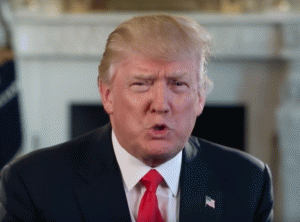From Consortium News

President Donald Trump giving his weekly address on Feb. 25, 2017.
(Image by (Screen shot from Whitehouse.gov)) Details DMCA
President Trump and House Speaker Paul Ryan are twisting congressional arms to get enough votes to push through repeal of the Affordable Care Act and replace it with a scheme that relies heavily on tax credits and would, according to the Congressional Budget Office, leave 24 million more uninsured Americans in 10 years. But there is also an army of activists and progressive healthcare workers who are opposing repeal without a real plan for providing broad-based health insurance.
On the front lines of this information battle is Dr. Carol Paris, president of Physicians for a National Health Program and a member of the steering committee for Health Over Profit for Everyone. She confronted Trump in Nashville, at a recent campaign style rally for "Repeal and Replace."
"I meant no disrespect to the President or his supporters," said Dr. Paris, after she was "rather roughly" taken out of the mostly pro-Trump gathering. "I simply did what I felt I had to do as a physician and American. Tens of thousands of people are dying needlessly due to lack of health insurance, and millions are suffering with financial burdens due to unaffordable health insurance and unaffordable health care. I know that a simple solution has already been introduced into the House of Representatives called H.R. 676 -- Expanded and Improved Medicare for All."
I spoke with Dr. Paris about her actions at the Trump rally and her concerns about what is in store for the 24 million additional people who will end up outside the America's profit-oriented heath insurance system.
Dennis Bernstein: You're from Nashville, tell us why you decided to go there and actually make a scene in public.
Carol Paris: Well, I want to acknowledge first that there were 2,500, approximately, 2,500 protesters outside of the rally. And these are hard working people who stood out in the cold, and took time at the end of their day to protest. I happen to be 64 and retired, so I have the freedom to get in line at 9:30 in the morning, and stand in the cold all day to make sure that I get a seat upfront. And I made that decision partly because I have the freedom to do that, and mostly because I really felt from a strategic standpoint, that this was the time to take a direct action.
DB: And, you were definitely a strong critic of Obamacare. And you were vocal with the groups that you work with, in terms of the failures of Obamacare. And so this is just a continuum, a resistance to, I guess, Obamacare on steroids. But, tell us about the confrontation. What exactly happened, and how did it feel to stand up? Were you afraid? Tell us about that.
CP: Well, of course, I was afraid. I wasn't raised to be confrontational, and so standing up to the President of the United States, and interrupting him was frankly, terrifying. But, it also was overshadowed, that fear was overshadowed by just an abiding conviction, we have people dying in this country because they can't get health insurance, and health care. I'm a physician, and I can't abide that. I really felt compelled to do this.
DB: And what did you do?
CP: Well, I knew that I was not going to be able to say very much, because I was really just waiting for him to take a breather, and find a quiet, relatively quiet moment in-between people cheering for every other word he said. So, when I thought that that moment had arrived I just stood up, held my sign as high as I could, and what I said was "Put your name on a plan that works, Medicare for all." And I just kept chanting that. There was so much more I would have liked to have said. But I knew that I wasn't going to get the opportunity at that point.
DB: I watched the video. " You repeated it a number of times and then you were approached by security. How did they treat you?
CP: The police officers were polite. One of them kind of pushed me a bit, because I was trying to exit past the press table, and he was not inclined to allow me to do that. So, he did sort of forcibly move me into an exit aisle. But, beyond that it was fine.
DB: And what did the people around you... did they start... they started to boo right? There was a lot of discontent with your expression. And how did the President react?
CP: Well, at that point I was distracted, and didn't actually... had stopped looking at the President. When I began, I looked right at him. He wasn't looking at me at that point. And, then I really just focused on saying what I was saying, as loudly as I could, and was more interested in trying to direct some attention to the press table because I wanted the press to see that I was protesting. So, I don't really know, it's only in watching the video afterwards that I see that he actually acknowledged that someone was protesting, and made a comment, I guess.
(Note: You can view every article as one long page if you sign up as an Advocate Member, or higher).





